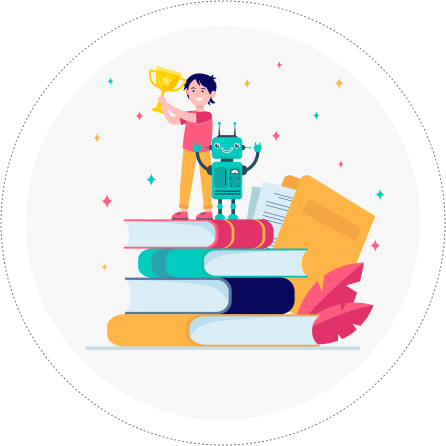Computer Application Class 10
- Home
- / Python Handay
- / Computer Application Class 10
Welcome!
The Computer Applications course for Class 10 includes a 50-mark theory paper and a 50-mark practical exam. The theory paper covers key topics like Networking, HTML for web design, and Cyber Ethics. Students gain practical skills in creating web pages and understanding online safety and ethical technology use.
Prerequisites
The prerequisites for learning Computer Applications in CBSE Class 10 include a basic understanding of computers, familiarity with the internet and browsing, knowledge of fundamental software tools like word processors, and a general interest in technology. Prior exposure to Class 9 computer concepts can also be helpful but isn’t mandatory.
Learning Objectives
The learning objectives for Computer Applications in CBSE Class 10 include understanding networking concepts, designing web pages using HTML, and exploring cyber ethics. Students will develop practical skills in using software tools for documentation and presentations, enabling them to apply technology effectively and responsibly in various contexts.
Course Overview
- Internet Concepts:
- World Wide Web, web servers, web clients, web sites, web pages.
- Web browsers, blogs, newsgroups, HTML basics, web address, email address.
- Uploading and downloading files from remote sites.
- Internet Protocols:
- TCP/IP, SMTP, POP3, HTTP, HTTPS.
- Remote Login and File Transfer Protocols: SSH, SFTP, FTP, SCP, TELNET.
- Communication Protocols: TCP/IP, SMTP.
- Internet Services:
- Information retrieval, using search engines, finding people online.
- Web Services: Chat, email, video conferencing, e-Learning, e-Banking, e-Shopping, e-Reservation, e-Governance, social networking.
- Mobile Technologies:
- SMS, MMS, 3G, 4G technology.
- Introduction to Web Page Designing Using HTML:
- Creating and saving HTML documents.
- Accessing web pages using web browsers.
- Basic HTML Tags:
- <html>, <head>, <title>, <body> (Attributes: text, background, bgcolor, link, vlink, alink).
- Text Formatting Tags: <br>, <hr>, <h1> to <h6>, <p>, <b>, <i>, <u>.
- Lists: <ul>, <ol>, <li> (Attributes: type, start).
- Description Lists: <dl>, <dt>, <dd>.
- Font Tags:
- Attributes: face, size, color.
- Inserting Media:
- Images: <img> (Attributes: src, width, height, alt).
- Super Script and Subscript: <sup>, <sub>.
- HTML Forms:
- Form Elements: Textbox, radio buttons, checkbox, password fields, list, combo box.
- Embedding audio and video elements.
- Creating Tables:
- Table Tags: <table>, <tr>, <th>, <td>, Rowspan/Colspan.
- Links and Anchors:
- Using the <a> tag (Attributes: href, mailto).
- Working with targets for hyperlinks.
- Cascading Style Sheets (CSS):
- CSS Basics: color, background-color, border-style.
- Formatting: margin, height, width, outline, font (family, style, size), text alignment, float property.
- Netiquettes:
- Best practices for respectful and safe online communication.
- Software Licenses and Open Source Software:
- Understanding software licenses and the importance of the open-source movement.
- Intellectual Property Rights:
- Overview of digital rights, plagiarism, and protection of intellectual property.
- Freedom of Information & Digital Divide:
- Discussing access to information and the gap in digital accessibility.
- E-Commerce:
- Key Concepts: Privacy concerns, fraud prevention, secure data transmission, and e-commerce regulations.
- Lab Test : 20 Marks
- Practical Report File: 15 Marks
- Viva Voce : 05 Marks
- Project : 10 Marks
Enquiry Now
Our Courses
Data Analyst using Python
Select Tech MindGuru for Why ?
Placement Assistance
Placement assistance offered for a successful career.
Membership
Membership provided until the final examination.
Personalized Attention
Personalized attention provided to each student.

Get Course Certificate
Certificate awarded upon completion of the course.
Monthly Tests
Regular monthly test series for progress evaluation.
Latest CBSE Syllabus
Training modules aligned with the latest CBSE syllabus.
Frequently Asked Questions
The syllabus covers Networking, HTML, and Cyber Ethics, along with practical applications in these areas.
The assessment consists of a 50-mark theory paper and a 50-mark practical exam.
Basic knowledge of computer fundamentals and prior experience with software applications are recommended.
Practical work includes hands-on exercises in HTML coding, networking tasks, and exploring cyber ethics scenarios.
Yes, students may be required to complete projects related to web design or networking as part of their practical assessment.
Students will develop skills in web page creation, understanding networking concepts, and applying ethical considerations in technology use.


